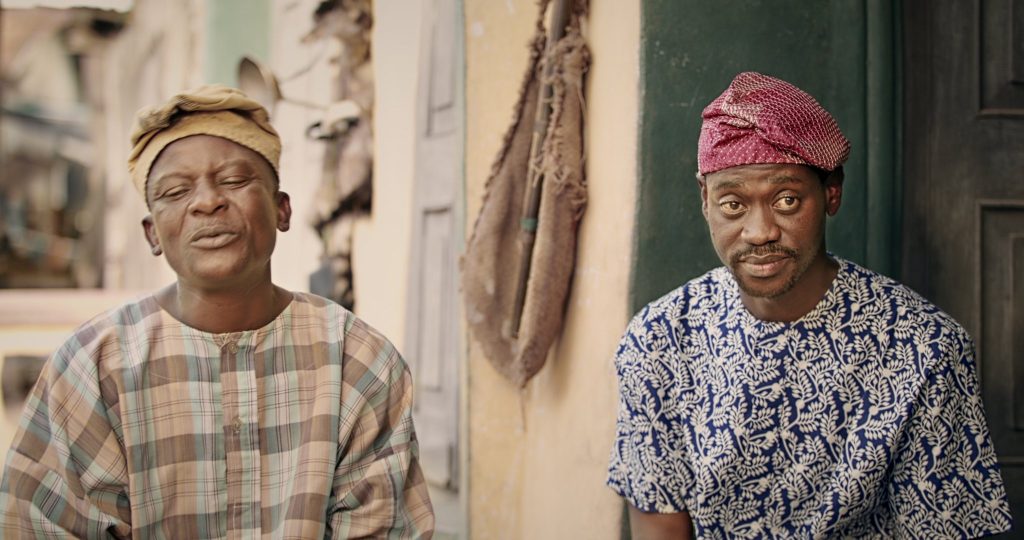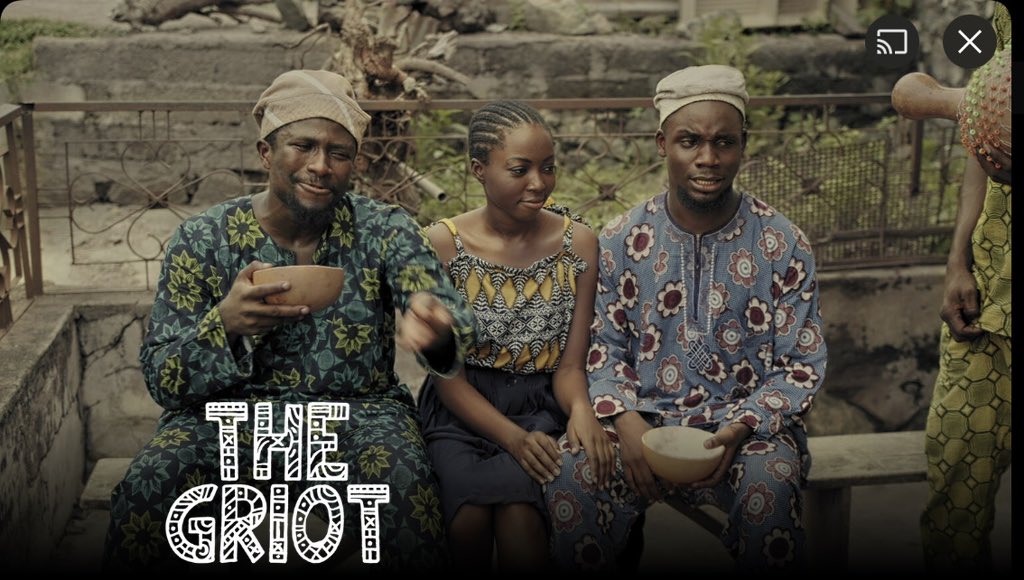…in The Griot, tragedy is handed out easily, like wine at a tasting party…
By Blessing Chinwendu Nwankwo
2022 seems to be the year of introspection for Nollywood, as the directors focus most of their light on culturally-themed films. With the likes of Anikulapo, Elesin Oba, King of Thieves, and now The Griot‘ currently topping chats on Netflix, Nollywood has been top of mind both locally and in the Diaspora. Although it is a 2021 production, the resurfacing of the epic is rather timely and a delight to viewers.
First, for its effort in the adaptation of the Yoruba culture and lifestyle —the highlight of aso-oke weaving, basket making, greetings, and other activities customary to the Yoruba tribe. Secondly, for his expertise as the director of photography and cinematography in numerous productions, including This Lady Called Life, Charge and Bail, My Village People, and Introducing the Kujus, the director, Adeoluwa Owu, mesmerises viewers with note-worthy imagery and motion pictures in his not-so-new movie. Unfortunately, for the potential it holds, The Griot underwhelms its viewers with plain scripting. the story in The Griot is written so simply that it fails to make a lasting impact, and underachieves as an epic.
(Read also: Anikulapo, Kunle Afolayan’s Latest Masterpiece, is an Hour too Long for the Unsatisfactory Act it Delivers)
The Griot unravels its theme of love, betrayal, and secrets as it tells a predictable but well-developed story. Unfortunately, this literary bliss is watered down by a tragic ending. I’m not an advocate for “happily ever after,” but in The Griot, tragedy is handed out easily, like wine at a tasting party. The film follows the story of a shy storyteller, whose stories bring fame to his friend. The storyteller who keeps away from objects that will feed attention to him will tell his friend stories based on his imagination, and his friend would go on to retell these stories in public gatherings. His friend’s fame quickly spreads across the country and to neighbouring towns.
Griots in West Africa are a class of traditional storytellers, poets, or musicians who convey the oral history of a village. Their stories are sometimes accompanied by music from local instruments like the kora and balafon. The griots are usually the eldest in a tribe, and the skill is often passed down to lineages, hence, it becomes a heritage that is carried on for generations.
Written by Temiloluwa Fosudo (who played Sanmi) and Dapo Lanre-Badmus, The Griot does not live up to its name. While there is a strong lesson learned, it holds no significance to history, at least not as much as Griot, a 2011 Senegalese documentary about Ablaye Cissoko. Luckily, these are flaws we can write off, seeing that the film is written and directed by less-experienced directors.

The production is nevertheless so thorough that even the unfamiliar cast members seamlessly execute their roles. So many elements in the film work, and simplicity is the key to its stupendous nature. The cinematography, the set design, and the soundtrack are all generously detailed and perfectly in tune with the themes. Unfortunately, the ending is vague and unsatisfying, as is typical of many Nollywood films.
The Griot takes us through Lakunle’s struggle and growth, as played by Lateef Adedimeji. Lakunle is a timid man whose first bold statement is seen when he stands up to fight for love. Lakunle is loving and admirable, but his timidity almost makes him miss out on what he desires the most: a relationship with Tiwa (Goodness Emmanuel). The contrast between Lakunle and Tiwa’s characters demonstrates how opposite charges attract. Tiwa is bold, outspoken, and famous across the land for her good singing abilities, while Lakunle is the exact opposite. Moreso, Lakunle would rather give his friend, Sanmi, the story narrations than bear the attention that comes with fame.
The film features a cast of skilled entertainers, including Funso Adeolu, Yewande Adekoya, Abimbola Adebajo, Kunle Afod, Imoh Eboh, and Opeyemi Dada, among others. Most of them are famous for their roles in other Yoruba movies.
(Read also: Elesin Oba Review: Netflix’s Death and the King’s Horseman’s Adaptation is a Play, Not Really a Film)
Meanwhile, contrary to what the synopsis implies, the tales aren’t stolen, just the credit. The Griot is also about greed and entitlement, among other things. However, it does not overemphasise the importance and healing power of a good story. The king’s health rejuvenates after medications are given by traditional healers, but not without credit to the good stories from Sanmi. The king then bestows on Sanmi a chieftaincy title (Obaniyi 1 of Wakajaiye Land) in recognition of his good stories, which not only brought him joy but also fame and recognition in the land. While we note Sanmi’s greed, we fail to appreciate his effort.
It is easy to crucify a person for being ambitious, forgetting that without his courage and foresight, Lakunle’s stories would never have seen the light of day. It is, after all, an infamous habit of humans to make judgements on situations before they experience them. With this, they paint an image that assumes they are worthier than they actually are.

The Griot has a chance to explore Yoruba mythology but wanders off as its dialogue is shaped by the modernity that surrounds its production. For an epic, the cast members are not engaged in any Yoruba dialogues for 80% of the running time. The constant use of the English language shrinks the message and destroys the originality of the movie. At first, I was confused at the rare application of Yoruba language in the production, seeing as most of the cast members are Yorubas—except Tiwa, the lead actress.
Also, the clarity of the story is lacking. There is no indication of the time period in which the film is set; however, the pattern of the dress, the presence of traditional beads and ornaments, the use of cowries as a means of exchange, and the significance attached to storytelling festivals all point to the pre-colonial era. Unfortunately, the film does not align with this assumption. The style of The Griot is way more contemporary than in the pre-colonial era. The most hilarious of all might be the zip on Iyemoja’s (the water goddess) skirt.
These are frivolities that discredit the production and cause visible loopholes in its execution. They are, however, excusable by an attentive audience that is only looking for entertainment, and so they emphasise the good parts over the flaws. The film outstretches its luck when it decides to attach irrelevant scenes to the already befitting production.
(Read also: King of Thieves Review: Femi Adebayo’s Epic Sets a New Standard for Nollywood)
Still, it is not out of place to see the production for what it is and appreciate the efforts put in place by the cast and crew in this work. The Griot is a good watch that may not exceed expectations but does quite enough to keep you interested and entertained through its 110-minute running time. The film is able to elevate the legacy of griots in the Yoruba tradition, and with its insightful soundtrack, it educates and serenades the viewers with its nice melody.
Rating: 3/5
(Watch The Griot on Netflix)
Blessing Chinwendu Nwankwo, a film critic, beautician, and accountant, currently writes from Lagos State, Nigeria. Feel free to drop your opinion in the comment section below. Connect with her on Twitter at @Glowup_by_Bee and on Instagram at @blackgirl_bee.



